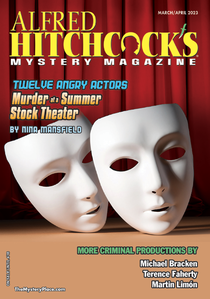While it seems like a long time ago, it's only been a couple of weeks
that I had the pleasure of attending Bouchercon 2024. The Anthony Boucher Memorial World Mystery Convention, is an annual convention of creators and devotees of mystery and detective fiction. It is named in honor of writer, reviewer, and editor Anthony Boucher, and pronounced the way he pronounced his name, rhyming with "voucher".Unarguably the world’s largest mystery writers’ conference, this year’s event was held in Nashville and was attended by over 1,700 participants.
Every time I go to Bouchercon, I come back, review my credit card statement, and ask myself, “Was it worth it?”
Of course it was.
If only from the standpoint of seeing some old friends, making some new friends, and getting the latest “scoop” from other writers, readers, publicists, voice actors, and folks who just love mysteries.
It was held in the world’s largest Marriott hotel--the Gaylord Opryland Resort and Convention Center is like something out of a science fiction movie. It’s basically a small city under a glass dome, complete with a river and boat, waterfalls, fountains, restaurants, bars, swimming pools, water attractions, and live music. The hotel consists of 3.3 million square feet of space, 2,888 guest rooms, and event space for a capacity of 10,000 people.
The first few days, literally everyone got lost getting from point A to point B. The hotel has its own directional app you download on your phone.
On Thursday, my publisher and publicists organized an afternoon long book signing session for Poisoned Pen/Sourcebooks authors. Each one of us easily went through a couple cases of books. I love my publicists, and it was great to have a couple of drinks with them later in the evening, along with some other writers, and learned that the same people who represent my books, also represent Freida McFadden (the hot new “it” mystery writer on all the best seller lists).
The next day I was on a panel entitled “That’s One Body They’ll Never Find”. The intent, I believe, was to talk about real life crimes that helped shape you as a writer or you incorporated in your books. It took a strange and morbid turn when, instead, we started off by recounting crimes that still haunt us. Many of them are unsolved. It got so dark that one of the panelists was in tears.
I finally offered to the audience that’s the reason we enjoy reading mysteries. They have a satisfying ending. The bad guy gets caught and justice is served.
Wasn’t a lot of laughs on that panel.
But the best part was hanging out with friends like Reed Bunzel, Tim Maleeny, John DeDakis, Terry Shepherd, and K.L. Murphy. And running into some other old friends and catching up with Jeffrey Siger, Hank Phillippi Ryan, Reavis Wortham, Laurie King, and the legendary Martin Edwards. And then was special time meeting and getting to know Clay Stafford, the founder of the Killer Nashville Mystery Conference. He’s an amazing guy.
And of course, on Sunday, when the conference was winding down, I took an Uber into downtown Nashville to do some exploring. It was blocks and blocks of bars and honky tonks. All of them with live music and some with cowboys (or cowgirls) inviting you inside.
Oh, if I was only my liver was twenty years younger.
There were great panels and panelists and special events, but the best part was just being with other writers to talk about writing, publishing and how to hide the bodies. Overall, worth the time and money. Next year….New Orleans, baby. www.thomaskiesauthor.com






















